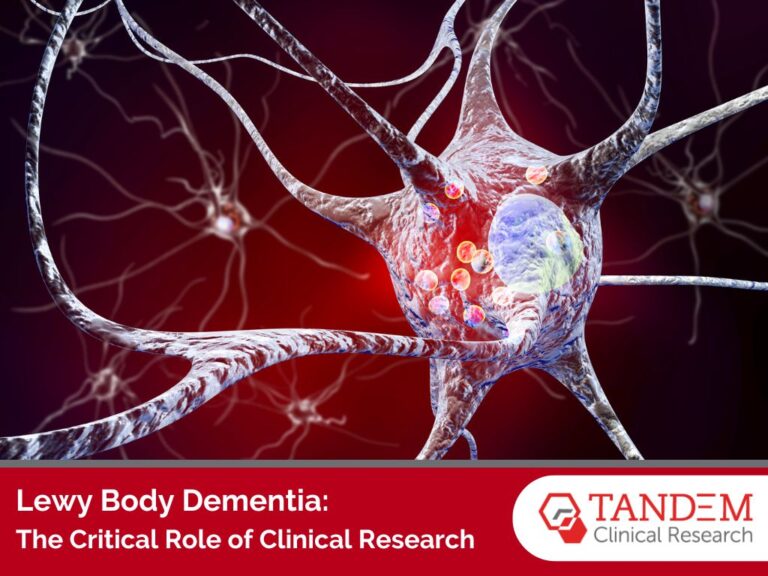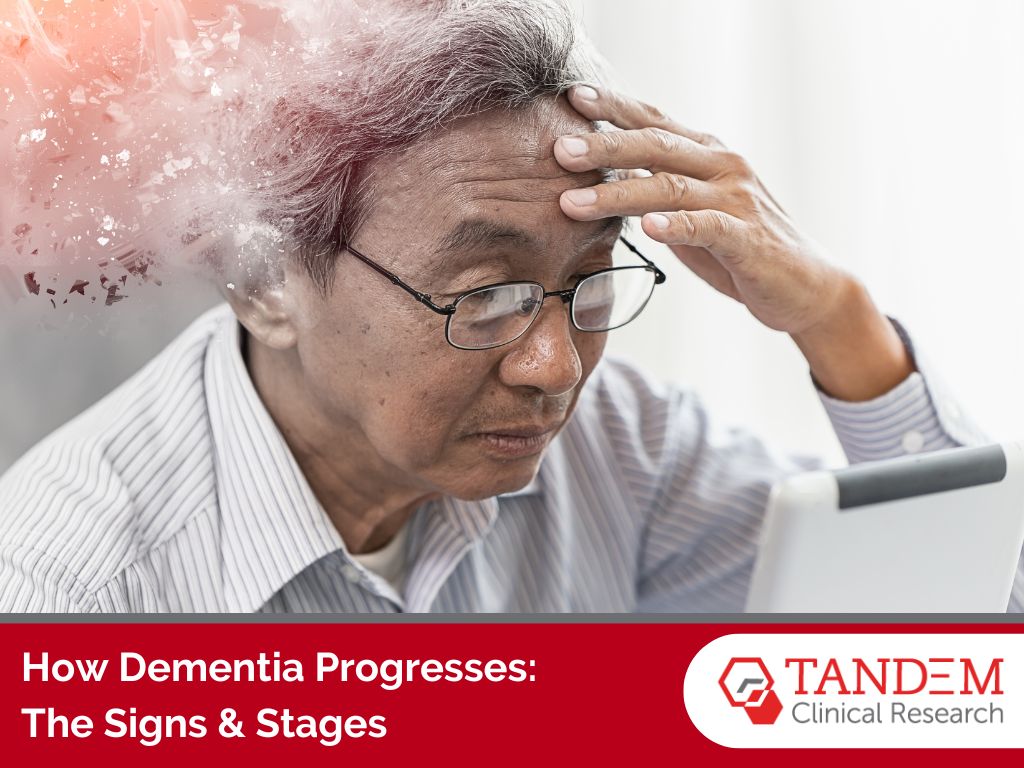
Dementia is a challenging and intricate condition impacting millions around the globe. It leads to a gradual decline in cognitive abilities, such as memory, reasoning, and communication skills.
After some time, dementia profoundly affects everyday life — and unfortunately, there’s currently no cure for the condition.
Understanding how dementia progresses is incredibly important for patients, their families, and caregivers. This insight can make planning and finding the right care easier while helping to set realistic expectations as the condition evolves.
While Alzheimer’s disease is the most common form of dementia (appearing in nearly 70% of cases), there are several other types — each with its own progression pattern and symptoms.
In this article, we’ll cover the various types, along with their main signs, symptoms, and stages.
Understanding Dementia

Dementia is a broad term for a range of cognitive disorders that lead to a decline in memory and other cognitive abilities. This condition arises from damage to brain cells, which hampers their ability to communicate effectively with one another. As a result, thinking, behavior, and feelings are all affected.
The changes in the brain can be gradual, but their impact is profound, altering how individuals with dementia interact with the world and their loved ones.
Types of Dementia
Alzheimer’s involves the buildup of amyloid plaques and tau tangles in the brain, which contribute to the loss of connections between neurons and, eventually, neuron death.
Alzheimer’s disease affects various brain functions, such as memory, thinking, judgment, language, problem-solving, personality, and movement. However, this is not the only condition that has these impacts.
Other types of dementia include:
- Vascular Dementia: Caused by reduced blood flow to the brain, often following a stroke.
- Lewy Body Dementia: Identified by abnormal protein deposits called Lewy bodies in the brain.
- Frontotemporal Dementia: Involves the degeneration of nerve cells in the frontal and temporal lobes of the brain.
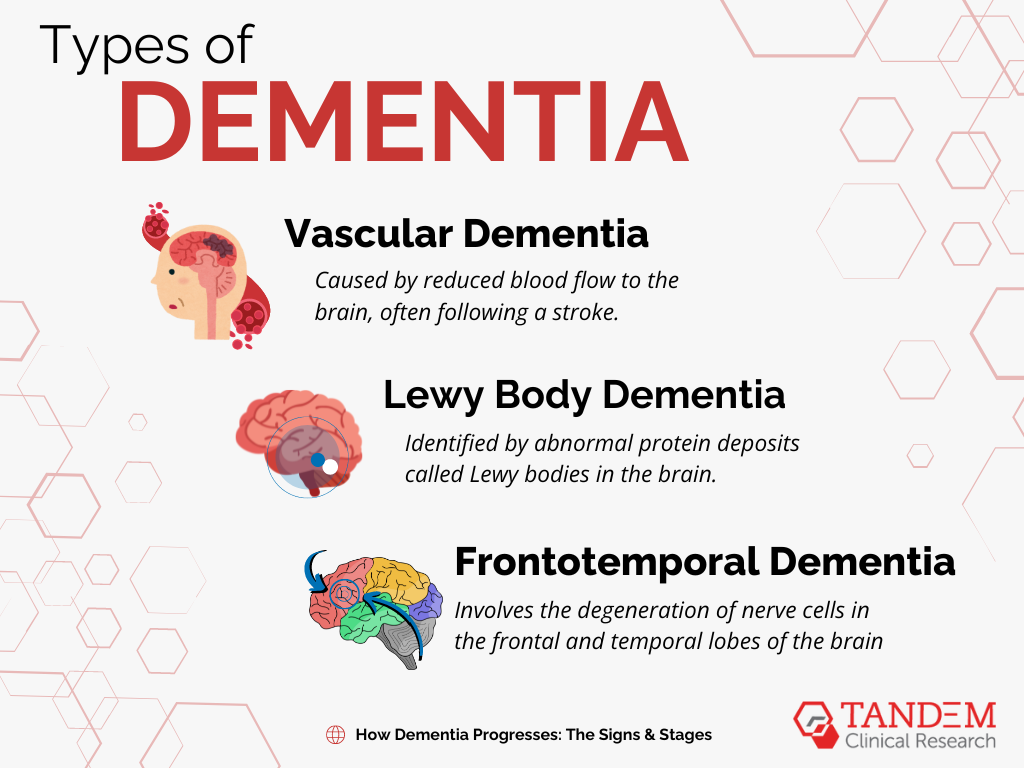
The Early Stages of Dementia Symptoms
Early-stage dementia is the initial phase in which symptoms (such as memory lapses and irritability) start to appear. Detecting dementia at this first stage can make a significant difference in management and quality of life for individuals with the disease.
Signs manifest behaviorally, physically, and cognitively, often starting subtly but becoming more noticeable over time. Here are some of the most notable symptoms:
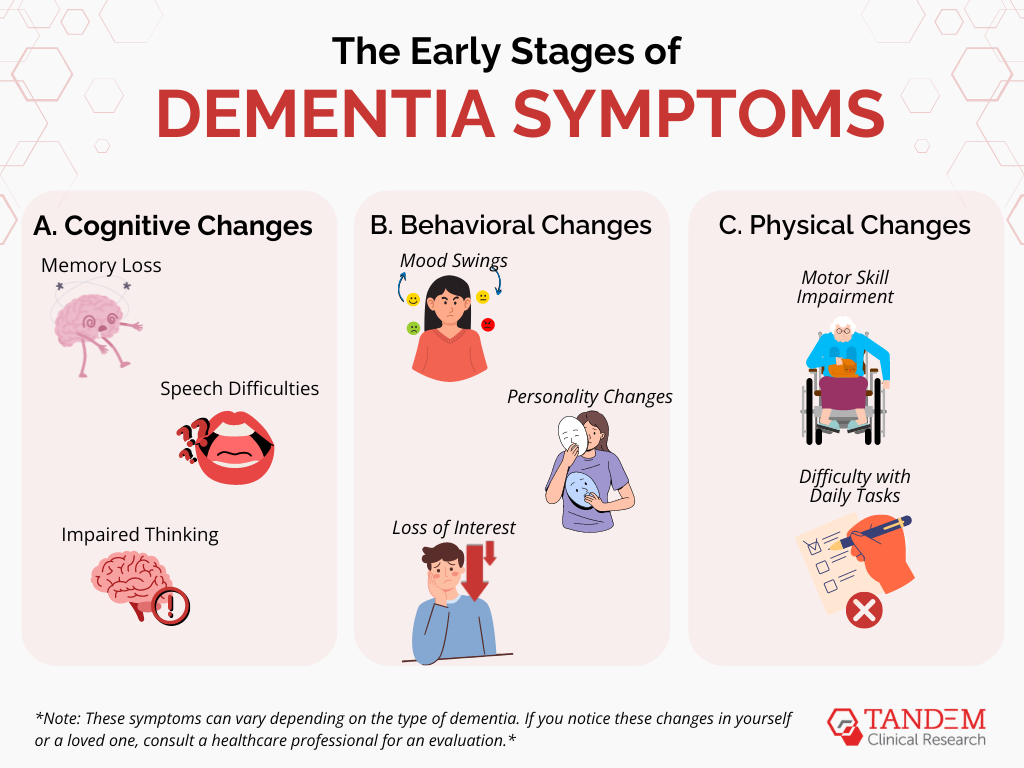
Cognitive Signs
An individual developing dementia may have cognitive symptoms early on. Memory loss, especially regarding recent events, is the most notable sign.
Of course, age-associated memory impairment is common among older adults. It may not necessarily progress to dementia/ However, someone developing dementia may also have difficulty finding the right words when speaking or following conversations. Additionally, they could struggle to complete familiar tasks or solve simple problems.
These signs can vary depending on the type of dementia. For example, memory loss is more pronounced in Alzheimer’s, whereas Lewy Body Dementia might initially affect movement or cause hallucinations.
Behavioral Signs
Behavioral signs of dementia include increased anxiety, depression, agitation, and withdrawal from social activities. Studies have found that individuals with dementia may also exhibit apathy, delusions, and mania.
These changes can be distressing for both the individual and their loved ones, who might struggle to understand why these shifts are happening.
Physical Signs
Dementia can also cause changes in mobility, coordination, and balance, leading to an increased risk of falls and injuries due to impaired motor skills.
These physical changes can make routine activities such as walking, dressing, and eating more challenging. Over time, the individual may require more assistance with daily tasks.
The Five Stages of Dementia
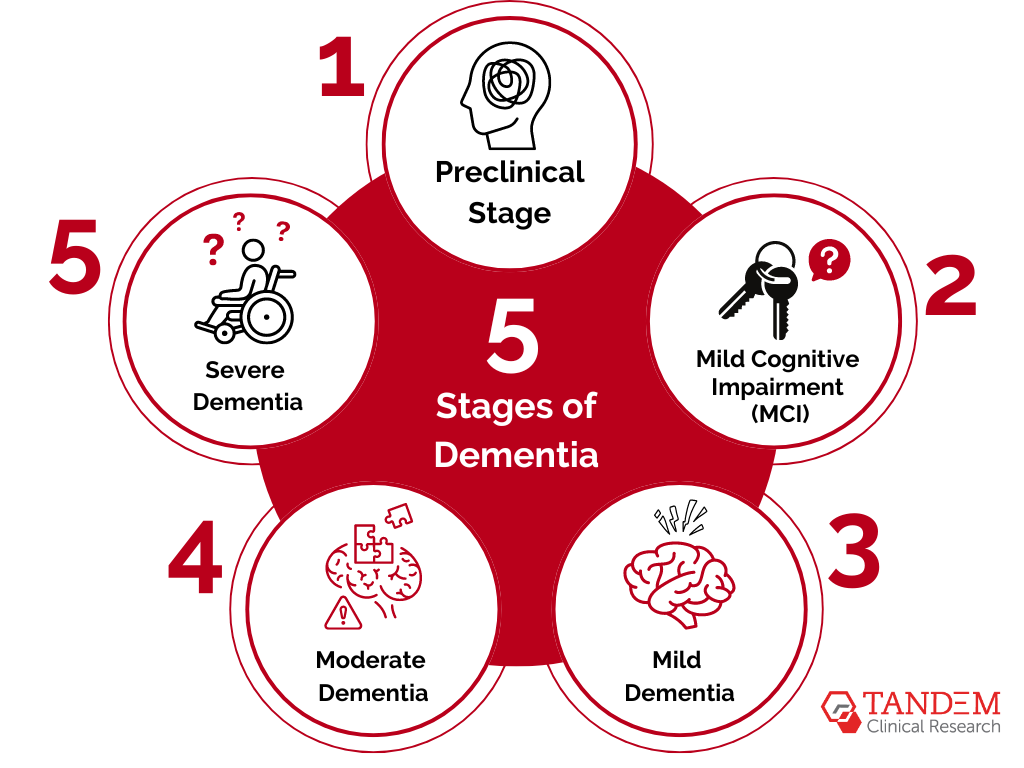
1. Preclinical Stage
At this stage, there are no noticeable symptoms, but changes are happening in the brain. This stage can last for years or even decades before any symptoms appear.
During this time, biomarkers such as amyloid plaques and tau tangles may begin to form, like in preclinical Alzheimer’s disease, which can be detected through advanced imaging techniques or cerebrospinal fluid analysis.
2. Mild Cognitive Impairment (MCI)
During the MCI stage, individuals experience mild changes in cognitive functions that are noticeable but not severe enough to interfere with daily life. Common signs include minor memory lapses, difficulties with complex tasks, and occasional lapses in judgment.
While these changes can be alarming, many people with MCI continue to live independently and manage their daily responsibilities.
3. Mild Dementia
At this stage, symptoms become more apparent and start to affect daily life. Individuals might forget recent events, struggle with problem-solving, and experience changes in personality.
As the disease progresses, they might need assistance with more complex tasks like managing finances or organizing a schedule. Additionally, social interactions may become more challenging as conversational skills decline.
4. Moderate Dementia
When moderate dementia sets in, the individual will need more help with daily activities. This middle stage of dementia involves more noticeable symptoms. For example, memory loss and confusion worsen. Significant changes in behavior and personality can also occur.
There might be difficulties with recognizing family and friends. Moreover, routine activities such as dressing, bathing, and meal preparation increasingly demand caregiver support.
5. Severe Dementia
Of all the stages of dementia, this is the most debilitating. Individuals lose the ability to communicate effectively and need help with all daily activities, including eating and personal care.
Physical abilities drastically decline at this point, and there is a high risk of infections and other health complications due to immobility. In this stage, the person may also become bedridden, lose the ability to respond to their environment, and require around-the-clock care.
The Importance of Early Dementia Diagnosis

When possible, early diagnosis of dementia is crucial as it allows access to treatment and support services sooner. These interventions can, in turn, slow the progression of symptoms and significantly improve quality of life.
Early diagnosis also gives families time to plan for the future, make important care decisions, and manage financial and legal matters.
Thus, if you or a loved one are experiencing any signs of dementia, it is essential to seek medical advice as soon as possible.
Managing and Supporting Dementia

Dementia can be incredibly challenging for those suffering from it, affecting all aspects of their lives and making everyday tasks increasingly difficult. That’s why support from caregivers and family members is crucial at every stage.
Caregivers can support patients by creating an unconditionally safe and supportive environment. They should also encourage physical activity and social engagement, both of which help maintain cognitive functions and overall well-being.
Additionally, using memory aids and maintaining routines can reduce confusion so individuals feel more secure and independent.
There is currently no cure for dementia. However, we do have access to various medical treatments and therapies that can help manage symptoms and improve the quality of life for patients with dementia. Medications can slow symptom progression, and non-drug approaches like cognitive stimulation therapy have also proven to be beneficial.
The Importance of Dementia Clinical Trials

Clinical trials for dementia and Alzheimer’s disease are crucial in advancing research and treatment for these debilitating conditions. These provide a structured and scientific approach to testing new therapies, medications, and interventions in a controlled environment.
Through dementia clinical trials, researchers can gather comprehensive data on the efficacy and safety of potential treatments, identifying which approaches are most effective in slowing disease progression, improving cognitive function, or enhancing the quality of life for patients.
Additionally, clinical trials are helping us understand the underlying mechanisms of Alzheimer’s and other types of dementia, which can lead to the discovery of novel therapeutic targets and more personalized treatment strategies.
Moreover, participating in clinical trials offers patients with dementia access to cutting-edge treatments that are not yet widely available, potentially benefiting from the latest advancements in medical science. Trials also contribute to the accumulation of valuable knowledge that can be shared across the global scientific community, fostering collaboration and accelerating the pace of discovery.
The insights gained from these studies are essential for developing new standards of care, informing public health policies, and ultimately finding a cure for dementia and Alzheimer’s disease.
Get Matched With Dementia Clinical Trials Today
Knowing the signs and stages of dementia is essential for early diagnosis and effective management. While dealing with dementia can be challenging, numerous resources and support systems are available to help patients and their families navigate this journey.
By supporting and engaging in clinical trials, patients with Alzheimer’s and dementia can help pave the way for a future where these conditions can be better managed, treated, and possibly eradicated.
At Tandem Clinical, we specialize in matching dementia patients with clinical trials that offer hope for the future. If you or a loved one are experiencing symptoms of dementia, consider participating in a clinical trial to contribute to the advancement of care.


